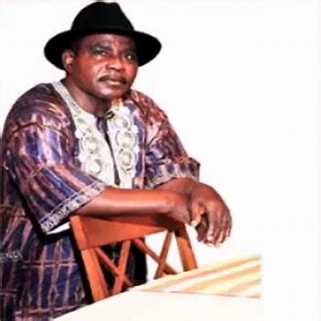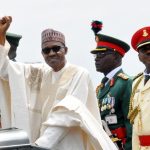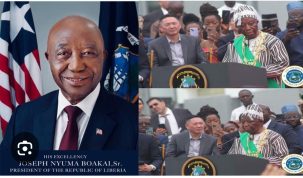Sunrise: December 6, 1942
Sunset: December 3, 2022
By Griot Siahyonkron J. K. Nyanseor, Sr.
Hampton, Georgia ,December 14, 2022
This is a story about Liberia’s patriotic Traditional Music Culture Icon, Seyon ‘Experience Tony’ Nagbe, a Maestro, whose music many, including this writer enjoy and appreciate because of the message it conveyed to all freedom loving people of Africa and the world.
This musical genius was born in Sasstown Territory, now Grand Kru County, Liberia unto the union of Nimely Nagbe and Slodeh Kun on Sunday, December 6, 1942.
‘Experience Tony’ had his address changed to a heavenly one on Sunday, December 3, 2022 at JFK Hospital in Monrovia, Liberia after a protracted period of illness; just 3 days before his 80th birthday.
Seyon ‘Experience Tony’ Nagbe Story
On Wednesday, August 15, 2012, Sister Mabel Jaryeneh Dargba Green called to ask me interview ‘Experience Tony’ Nagbe in order to write his life story for a program that was being planned in Charlotte, North Carolina for his 70th birthday celebration.
On Wednesday, August 22, 2012, I had the interview with him at 2571 Candler Road, Apt. H-10, Decatur, GA 30032, where he and brother Boniface Sarwieh lived. This interview is Experience Tony’s history for prosperity.
Brief Bio
Anthony Seyon Nagbe was born in Sasstown Territory, now Grand Kru County, Liberia unto the union of Nimely Nagbe and Slodeh Kun on Sunday, December 6, 1942. His parents had twelve children; he was the third child of the family. He attended St. Paul Catholic School in Sasstown. In 1952, when he was ten years of age, his parents sent him and one of his brothers by way of canoe to Monrovia; they landed in Clara Town. While residing in Clara Town, he enrolled in Tubman Public School; a school established by Ms. Clara Doe. Later, he matriculated to Government Junior High School, BTC; there he completed the 9th grade. At the age of twenty, while still a student, he held vacation jobs working on board commercial ships docked at the Freeport of Monrovia in order to earn money to take care of his expense the following school year.
Like most young boys his age, Anthony’s dream was becoming a soccer (football) star. His dream was realized when St. Joseph’s Warriors Soccer Club recruited him. He played Left Full Back (Number 3) for the club; yet, that did not prevent him from pursuing his love for music.
The Birth of Tejajlu
Tejajlu was first known as the “Kru Kings.” The group got started in 1969 at the wake of a young friend, named, Togba Nyeneh who without being sick, died suddenly in Clara Town (Klaowehta: translated as the Klao people’s place), Monrovia. Several of the members of the group played soccer with the late Togba in Klaowehta (Clara Town), Monrovia.
At the wake keeping at the late Togba’s father’s house in Klaowehta (Clara Town), drums and other instruments were made available and Togba’s friends and associates assembled to pay their last respect and tributes. They sang football and traditional Klao (Kru) cultural songs. During the wake, individuals raised and sang songs of their choice; everybody sang along. As the wake progressed, Mark Wleh Arthur suggested that ‘Experience Tony’ take the lead in singing the songs. The suggestion was accepted by all in attendance; ‘Experience Tony’ was then appointed as the lead singer. The selection of ‘Experience Tony’ was based on his commanding, “intoxicating unique” way he used his voice in singing. The performances that night gave birth to the idea of organizing a choral group.
Individuals who participated in the initial discussion were: ‘Experience Tony’ Senyon, Ambrose “Boyee” Blamo, Vincent Weah, William Wleh, Patrick Worjloh Arthur, Mark Wleh Arthur, Kassum Wilson, Patrick Worjloh, Lawrence Nyankun Chea, Francis Jarteh, etc. The two women present were, Paykay Munah and Nagbe Tarloh, who later became matrons of the group.
When Lawrence Nyankun Chea, one of the original founders of the “Kru Kings” died in 1970, members of the group had a meeting and decided to select another name for the group. The names, the “Kru Kings” and Tejajlu (“Upcoming Children”) in the Klao (Kru) language were proposed by Kingston Nimely. Both names were voted on and Tejajlu received majority of the votes. From there on, the group became known as “Tejajlu” and “Experience Tony” became the Lead Singer and the group’s leader.
Later on, in remembrance of the late Nyankun, a soccer team was organized and named Nyankun Invincible Eleven (NIE). As the result of Tejajlu and the soccer team activities, Tejajlu became widely known throughout the country, especially with cultural groups and soccer fans. What made Tejajlu popular at the time was – it transcended all Liberian social and ethnic groups; “everyone could sing and relate to their songs, especially, footballers and their fans.” The group members were passionate about promoting Liberia’s rich cultural heritage.
Oldman Kloh Twe, then Governor of the Borough of New Kru Town (Kloh Daye-Daye Kpor – Klao Language) should be considered Tejajlu’s first sponsor. The Governor provided his residence in Kloh Daye-Daye Kpor (New Kru Town) for the group’s meetings and rehearsals. However, when the group expanded, they needed a place that could provide the space and privacy for its meetings and rehearsals. That’s when ‘Experience Tony’ approached Brother Joseph Marino of the Catholic faith, sponsor of St. Joseph Warriors soccer team for assistance. Without hesitation, Brother Marino offered his clinic, which was located in the Borough of New Kru for Tejajlu to have their meetings and rehearsals. The deal was made easy because ‘Experience Tony’ was already playing for St. Joseph Warriors and Tejajlu served as the cheering squad whenever the team was playing.
Tony’s Leadership Experience
Under Experience Tony’s leadership, Tejajlu became an overnight sensation, and was widely known throughout the country; especially, with culture groups and soccer fans. They sang at soccer games, funerals, weddings, parties and events organized by the Student Unification Party (SUP) at the University Of Liberia (LU) and the advocacy branch of the Movement for Justice in Africa (MOJA – Liberia).
Tejajlu’s Kru Signature Song
“Nah nyenpuah nie nar jay swehn, say Konkwan kon, say bai kon, Nyesuah tin nar for, mehmeh ti nar for” – translated from Krao (Kru) to English as’ My people I am suffering, I am unemployed so I am without friends; I am waiting on God’s time; I am waiting on death, is the song with its defining lyrics this singer and social critic Anthony Seyon Nagbe, used to captured the pitiable plight of Monrovia’s restless urban youths who could not wait for gradual change.
Their unmistakable political message helped in alienating powerless disenfranchised masses from de facto One Party System of the TWP. It was the awareness songs of ‘Experience Tony’ and his Dar-yea Musical Ensemble that brought to bear on the topography that attracted attention of progressives, particularly Dr. Togba-Nah Tipoteh of MOJA, SUP, and Liberians that were yearning for social change.
The Student Unification Party (SUP) at the University of Liberia (LU) was one of the first advocacy organizations to invite Tejajlu to perform at most of their events. Tejajlu took part in many of SUP’s events at the LU. Later, Dr. Togba-Nah Tipoteh and Professor Dew Tuan-Wleh Mayson were instrumental in promoting Tejajlu. They introduced the group to the Liberian branch of the Movement for Justice in Africa (MOJA) arranging for Tejajlu to participate in MOJA’s 2nd Congress, which was held in March, 1979 at the Monrovia City Hall in Sinkor, Monrovia. Tejajlu soon joined the wave of social and politically-conscious Movements taking root around Africa in the 70s and 80s. During this period there were liberation struggles all over Africa. Tejajlu performed revolutionary, social and politically-conscious songs at these programs.
Tejajlu became part of the “Cultural Revivalist Movement” that fought for freedom and justice all over Africa and its Diaspora. Their songs in Klao (Kru) advocated for Social Justice, Pan-Africanism, anti-apartheid struggle in South Africa and African Unity. The message in these songs was revolutionary in that they called for change all over the world. The titles of some of their songs are:
“The Baboons”
“My People, I am Suffering”
“Dr. Kwame Nkrumah”
“Soweto Uprising”
“Our Eyes are Open”
“No more Thieving”
“We are all Liberians”
“Liberia is our Home”
“Liberian Leaders fight for Liberia”
“Freedom Fighters fight for Liberia”
“Only Unity is what we want”
“What time is it?”
Awards
In 1980, when the People’s Redemption Council (PRC) came to power, a cultural competition was organized, and many performing artists and cultural groups from all over Liberia took part. Tejajlu participated and took first place in the competition because of the group’s singing style and popularity.
Tejajlu Social Club won several national awards. One such award was the 1980 People’s Redemption Council (PRC) cultural competition in which performing artists and cultural groups from all over Liberia took part. Tejajlu participated and won first place.
Tejajlu continued performing up until the Liberian Civil War; but many members of Social Club were victims of the war years and died leaving the group disorganized. Tony too, had to seek refuge in Ghana for a while.
In July 1989, “Experience Tony” was assisted with air passage by Liberia’s soccer star George Manneh Weah, now President of Liberia to travel to United States of America. Prior to relocating to the U.S., he worked as a Mechanic for LIBTRACO from 1969 – 1981. In addition, General J. Nicholas Podier then the Speaker of the People’s Redemption Council (PRC) had him employed as a Cultural Research Officer at the Bureau of Cultural Affairs, Ministry of Information and Cultural Affairs until 1989.
July of 1989, Anthony Senyon “Experience” Nagbe left Liberia for the United States. He was assisted by then, the Liberia’s soccer star, George Manneh Weah. Six months after he arrived in the US, Liberia was invaded by rebel forces resulting in the notorious 14th years’ Civil War. Tejajlu continue performing in the absence of Experience Nagbe. Mr. Dugbeh Togba Nah, popularly known as “Dangerous” for his comedic performances and other members of the group carried on Tejajlu’s legacy. However, many members of Tejajlu were victims of the war years and have passed away.
“What time is it?” became Tejajlu’s theme song was written in 1973 by Comrade Siahyonkron Jglay Kpa-kay Nyanseor.
Find below the words of the song:
What Time Is It?
*Bartee Oh, Bartee, Bartee!
What time is it? Liberation time!
What time is it? Liberation time!
African freedom will not be negotiated
Nor will we accept détente as the solution.
We firmly say, Awina.
This is our decision!
You have given us no choice
But to resort to arm struggle!
Our love for freedom
Is the most profound love to exist!
Our commitment to the African Revolution
Is the most meaningful commitment
To carry out together.
We as an oppressed people
Will build the strengths
To withstand their forces
The forces that seek to keep us divided.
You Capitalists, Colonialists,
Neo-Colonialists and Imperialists
Opportunists and reactionaries
Will be gotten rid of
By “any means necessary.”
The African revolution,
The Black revolution,
Though, it may be shaken
But cannot be destroyed;
Our love, work and struggle
Have become one
As long as there are masses
To carry it out;
We shall be victorious!
Long live West Africa!
Long live South Africa!
Long live East Africa!
Long live North Africa!
Long live Namibia!
Long live the OAU!
Long live our comrades
All over the world!
Bobueh Tah Pah TISI!
The time for ignorance has passed!
We will continue to be exploited
If we fail to unite ourselves.
Exploitation breeds ignorance
And ignorance breeds apathy
Apathy breeds do-nothingness.
Now that we are determined,
Africa shall be free! Freedom!
Awina! This is our decision!
Clash of Liberian Cultures
There is this occasion that takes me ‘down Liberia’s ugly cultures’ memory lane’. It happened on Saturday, May 26, 2012. I rode with my junior brother and his wife: Sarkpah and Ankie Nyanseor to attend a wedding anniversary celebration of Cousin Jerry Verdier in Charlotte, North Carolina. There were many former Liberian Soccer Players at the program. But then, all the way here in Charlotte, North Carolina; we encountered Liberia’s ‘Ugly Colonial Culture divide’ that many of us experienced growing up in Liberia.
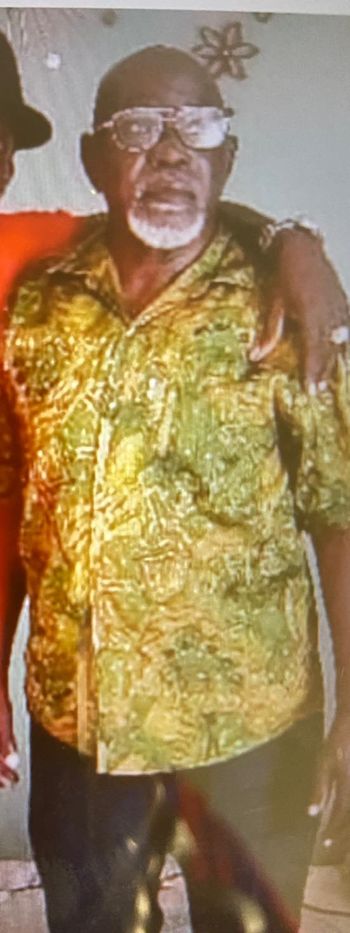
Experience Tony was present at the event to grace the occasion with his Tejajlu songs that intoxicated most of those in attendance, except, a few Marylanders from (Maryland, Liberia, West Africa). This created a culture clash!
When all protocols were observed, Jerry’s wife who is a Liberian from Maryland, Liberia – she, her family and friends took over the party without regards to her husband’s family and friends. It was a clash of Liberia’s Two Cultures, the imported (Colonial) and traditional (Country); simply refers to in Liberia as Country and Congor. The event hall was taken over by Mrs. Verdier and her group, relegated her husband Jerry and his invitees, which consisted of his family members, former soccer players and admirers of Experience Tony’s Tejajlu songs to the backyard to provide the entertainment.
Those in the hall were entertained with two popular songs of Maryland, Liberia: “Carry Me Halfway” and “Who say so; Shad say so, Are Gleby Nan, Non Soda” dancing Quadrille; the dance version of an 18th Century Square Dance, which originated from antebellum American South that was brought to Liberia by free Blacks that was imposed on Liberians as the National Dance.
This practice reminds me of the profound statement made by Dr. Amos N. Wilson:“If we don’t know ourselves, not only are we a puzzle to ourselves; other people are also a puzzle to us as well. We assume the wrong identity and identify ourselves with our enemies. If we don’t know who we are then we are whomever somebody tells us we are.” (The Falsification of Afrikan Consciousness)
In short, those of us who were entertained by Tony’s Tejajlu songs in the backyard had impact on the participants in the hall to the point that all of them gravitated to the backyard to sing and dance to Experience Tony’s Tejajlu songs. Finally, the day was won by traditional culture songs. This is what Mr. Rudolf Janke referred to as, “Preserving the country’s heritage means to save the story from being lost”.
Experience Tony’s Homegoing
Tony, it broke our hearts to lose you. You did not go alone; for part of us went with you the day God called you home. Even though, we cannot see you, but you left us with joy and happy memories, which we will cherish forever.
‘Experience Tony’ Nagbe left to mourn his homegoing: son GodpekinNancyonlyson Nagbe (Facebook), daughter Tita Nagbe, his extended family members throughout the world, you left Tejajlu under the leadership of Jarteh Frank Sieka to continue. Posterity will forever remember their Folklore songs. The members of Tejajlu will always be loved and cherished by their many fans in Liberia and its Diaspora.
‘Experience Tony’ Nagbe will be laid to rest on Thursday, December 22, 2022 at 10am in Caldwell, Liberia.
I bade you farewell Seyon ‘Experience Tony’ Nagbe; our Ancestors and Comedian Dugbeh ‘Dangerous’ Togba Nah and many of your departed associates are waiting eagerly to welcome you to this great reunion.
Your Revolutionary Cultural Ensemble, Tejajlu shall live on forever!
So REST IN PEACE, our Genius Maestro until we meet again!
Gwe feh Kpeh! (The Struggle continues)
Griot Siahyonkron J. K. Nyanseor, Sr.
Your friend & brother
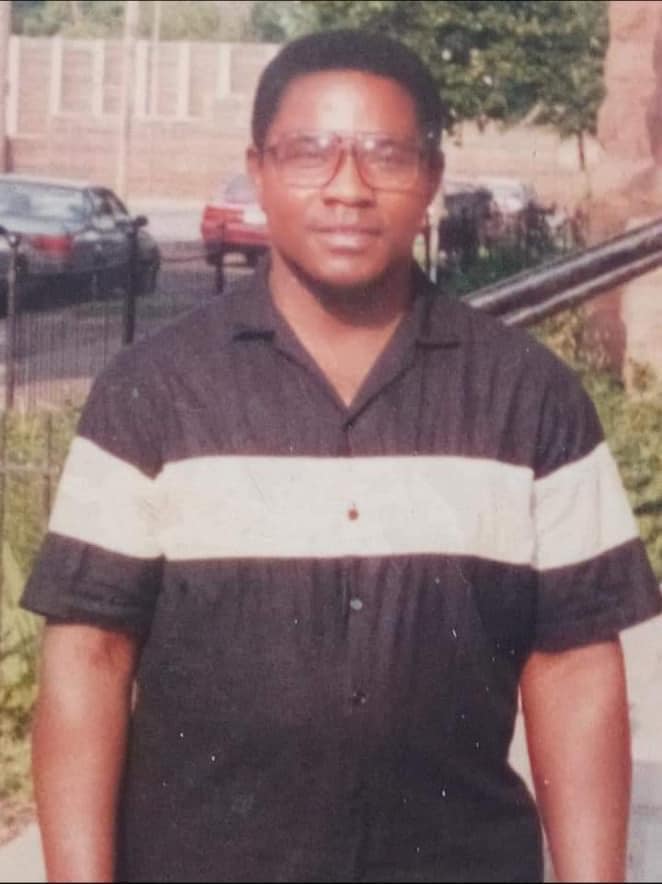
About The Author: Elder Siahyonkron Jglay Kpa-kay Nyanseor, Sr. is a life-long activist (*troublemaker) in researching the true history of Africa, the people of African origin in the 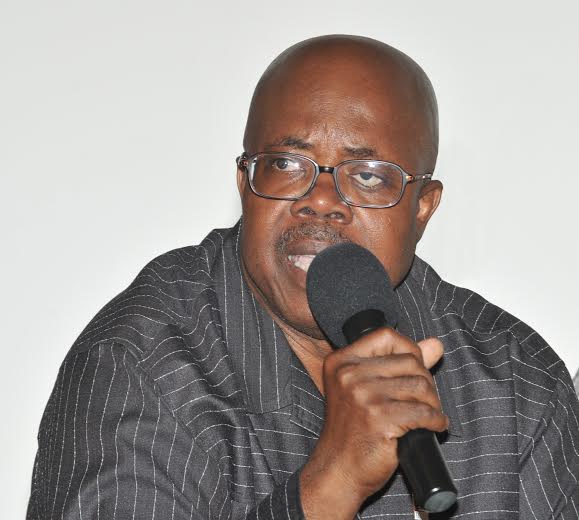 Diaspora. He had dedicated his teaching of African culture; spent over 48 years advocating for human, civil and constitutional rights of all people, especially, the Liberian masses. He is a lifelong member of the Movement of Justice in Africa (MOJA – Liberia) and the Liberian People’s Party (LPP); Chairman of the Liberian Democratic Future (LDF), publisher of theperspective.org online newsmagazine and Senior Advisor to many Liberian online newsmagazines. In 2012, he Co-authored Djogbachiachuwa: The Liberian Literature Anthology and a book of poems: TIPOSAH: Message from the Palava Hut. He is a Griot, poet, journalist and an ordained Minister of the Gospel. He can be contacted at:[email protected].
Diaspora. He had dedicated his teaching of African culture; spent over 48 years advocating for human, civil and constitutional rights of all people, especially, the Liberian masses. He is a lifelong member of the Movement of Justice in Africa (MOJA – Liberia) and the Liberian People’s Party (LPP); Chairman of the Liberian Democratic Future (LDF), publisher of theperspective.org online newsmagazine and Senior Advisor to many Liberian online newsmagazines. In 2012, he Co-authored Djogbachiachuwa: The Liberian Literature Anthology and a book of poems: TIPOSAH: Message from the Palava Hut. He is a Griot, poet, journalist and an ordained Minister of the Gospel. He can be contacted at:[email protected].
Note: *“Bartee Oh, Bartee, Bartee!” became a rally or call to orders in the Klao (Kru) Language. It was named a Klao/Kru Chief Bartee, who was known for settling palava.

